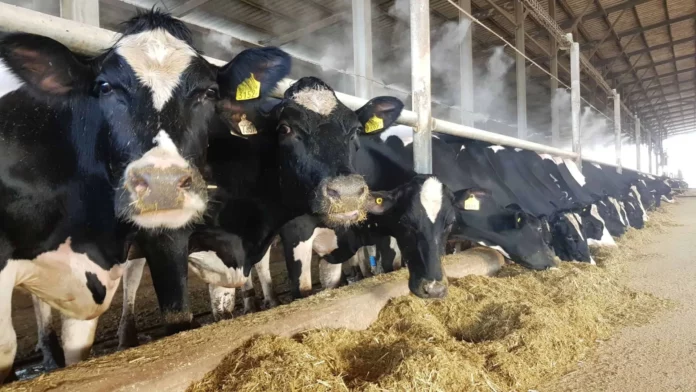Feeding is one of the important aspects of dairy farming as it largely affects the quality of milk produced by the animal. In addition, every dairy farmer’s wish is to see their cows produce the highest amount of milk.
This can, however, not be achieved without proper feeding. With the cost of animal feeds going up daily, farmers have come up with alternative feeding methods, with some witnessing great success.
Gideon, a farmer in Baringo County, has achieved great success in dairy farming after adopting homemade feeds.
In an interview with Aim Agriculture, the farmer, who is also a building and construction professional, revealed he started with one cow, which later multiplied to ten dairy cows, producing between 18 to 32 litres of milk each per day.
He credits the high production to quality feeding. Gideon feeds his cow a mixture of Nappier grass, maize stovers, wheat bran, and molasses.
Mary Mathuli: Makueni chicken queen whose farming skills inspired billionaire Bill Gates
The farmer rears the Friesian breed, which he says is able to retain high milk production for a long period of time, unlike Ayrshires, which reduce production just three months after they are served.
Gideon Milks his cows three times a day –in the morning, afternoon, and evening. The lowest-producing cow, which is seven months pregnant, produces 8 litres of milk per day, with the best milker producing between 27-32 litres of milk per day.
”We milk the cows thrice daily, and when milking, we give them a plain dairy meal. Each cow will take 2-3 kilos depending on the weight and the milk it produces..’’ he said.
”So after milking, we feed the cows using maize stovers, Nappiers grass, wheat bran, and a portion of molasses and release them to rest,’’ Gideon added.
The farmer grows fodder on his farm, which he says has helped him cut production costs. He currently grows ordinary Nappier grass, but he intends to start growing the Super Napier Grass (Pakchong 1).
Among the challenges he has encountered are diseases such as rabies which claimed three of his cows. Gideon advised farmers to vaccinate their cows against rabies at least once a year.
”There is also mastitis which is either brought by poor milking or poor hygiene. This can bring a very big loss to the farmer because the cow will not give you the desired amount of milk as it will be restless when milking. This also means you will have to take a whole week treating the disease,’’ he noted.
To curb this, Gideon advised farmers to get a good milker with some years of experience as well as maintain a high level of hygiene.
Besides dairy farming, Gideon doubles up as a Dorper sheep farmer and grows various crops, including cabbage, coffee, and avocado, which he fertilizes organically using manure from his farm.








